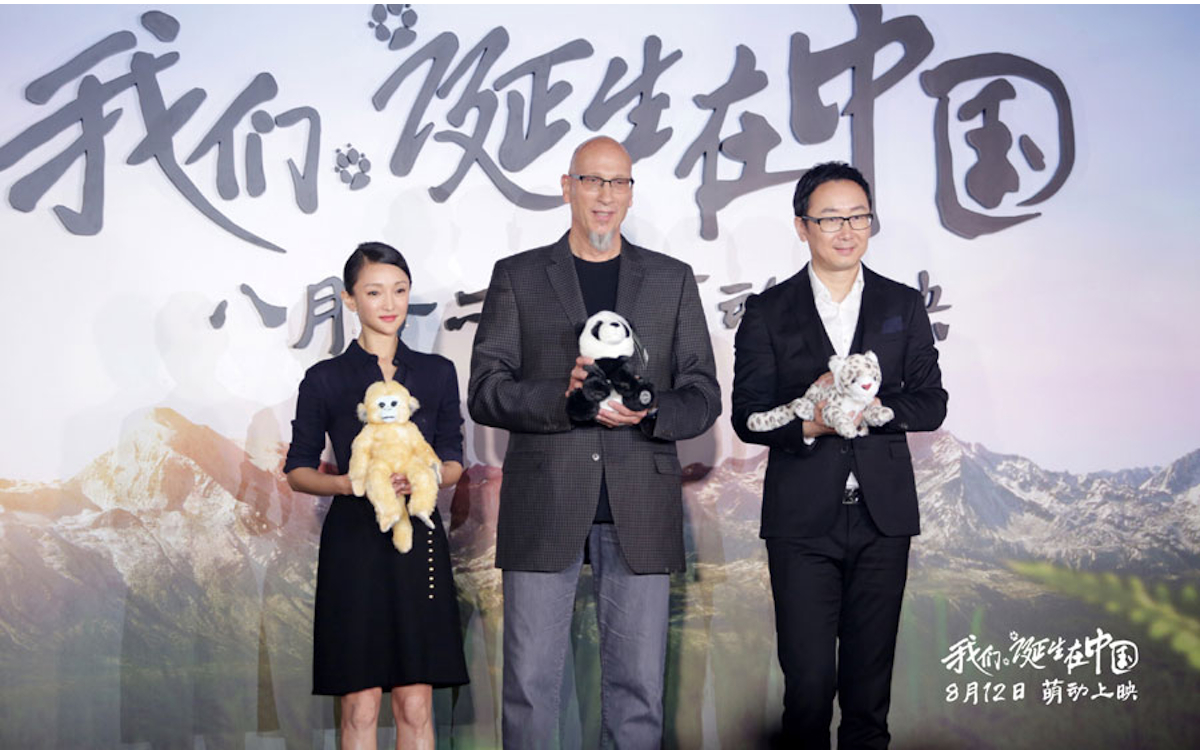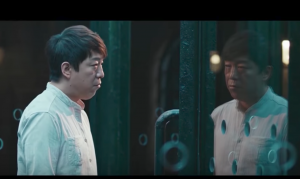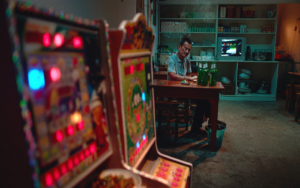Every day while CFI’s Hollywood readers take in the business of the Chinese film industry, the actual movies can sometimes seem exotic or remote. But in major US cities, mainstream Chinese films are increasingly available: thanks to Wanda’s purchase of AMC and distributors like China Lion, they get American theatrical releases practically simultaneous to their premieres at home. Though they receive virtually no publicity outside the non-Chinese community, these films are more than worth seeking out by anyone serious about engaging the Chinese industry, understanding the Chinese sensibility and familiarizing themselves with China’s talent pool. Periodically, CFI will review and point readers in the direction of noteworthy US releases of contemporary commercial and independent Chinese titles.

Born In China (2016), Written by David Fowler and Brian Leith & Phil Chapman and Lu Chuan; Directed by Lu Chuan.
Distributed by The Walt Disney Company; Opens April 19, 2017 (Cinemas here).
Grade: B-
In 2004, Lu Chuan directed Kekexili: Mountain Patrol, a hardboiled rural thriller made with help from China-savvy producers at Columbia Pictures. Centered on the efforts of a handful of herders on the Tibet-China border to keep the endangered chiru, or Tibetan antelope from dying off at the hands of poachers seeking its highly-prized wool, the film raised awareness both in and outside China of the rapidly-developing country’s struggle to preserve its natural environment.
Written and directed by Lu, Kekexili won prizes in Taiwan, Tokyo, Hong Kong and Berlin. When it was given an US arthouse release in 2006, The New York Times called it a “blood-boiling environmental thriller with a dash of Sergio Leone.” The harsh atmosphere of the film’s locale was resonantly woven into the film.
After Kekexili, Lu, a graduate of the Beijing Film Academy, went on to make the critically acclaimed, difficult-to-watch City of Life and Death (2009), a drama that managed to humanize the most vilified archetype in contemporary Chinese cinema: the pillaging solider of Japan’s Imperial Army of the 1930s. As a director, Lu had very quickly proven himself capable of addressing uncomfortable subjects in a country where filmmakers are often actively discouraged from putting strongly-held views and individual interpretations of history into their works.
Given Kekexili, it may have seemed natural (to coin a phrase), that Lu should direct Born in China, a Disney documentary about animals facing extinction in China. With China’s breakneck growth and its President talking about taking the lead in global warming prevention, what better time for a Chinese director to show the world that beyond the cities on its smog-choked coast resides an innocent China of vast natural beauty and splendor in need of protection?
Starting with the chiru in Qinghai, and working over the course of a yearlong cycle from one Spring to the next, Lu’s latest film does just that. It flies the viewer into close contact with parent-and-baby pairs of pandas, golden monkeys and snow leopards in a China that almost no one, including many Chinese, has ever seen.
Lu and his cinematographers—a team of experienced Western nature documentarians—can’t make a bad scene in Qinghai (home to the chiru and the snow leopards, and, once upon a time, the Dalai Lama—it’s his birthplace, though that, and Tibetan culture’s deep respect for the land, go unmentioned in the film). Nor do the pandas, Ya Ya and her daughter Mai Mai in neighboring Sichuan ever look unappealing. The landscapes in the film and the animals that occupy them are breathtakingly beautiful and warmly adorable.
For viewers who’ve never been there, the pandas are most obviously Chinese. They’re certainly cute, if predictably helpless, almost human in their need for their mothers and their clumsiness as toddlers. The chiru make a compelling migration to calve their young, who, unlike the panda, are up and running in a few days, then hoofing it hundreds of miles, outrunning wolves, to graze under gigantic summer skies at the roof of the world.
In the golden monkey section, a young male protagonist the screenwriters call Taotao is shown joining a mischievous crew dubbed “the Lost Boys,” swinging, roughhousing, squabbling and preening. Their flaming yellow-and-orange fur is fantastic, and the camera set-ups, including tree-top positions that allow the slow motion capture of goss hawk predators attacking baby monkeys, present one gorgeous composition after another.
Most remarkable, however, are Dao-a, a snow leopard and her two cubs. Stealthy big cats surviving in the highest crags, picking off nimble and quick beryl sheep with terrifying speed and grace. Watching them is a treat, and their story, of struggle against encroaching leopards of greater size and number, and against a intruding herd of domesticated yak, belie that even up there, at fourteen thousand feet above sea level, the humans never seen on screen are not far out of the frame and are changing the landscape. That Dao-a meets her match at the horns of a yak wearing a man-made bell around its neck basically says it all.
The sound of the bell spells doom for this feline queen and yet the sound of man’s voice—the narrator, John Krasinki’s, in this case—makes little more than oblique reference to China’s historical difficulty at protecting its own precious resources from man-made progress. (The country, now in its seventh decade under Communist rule, is only just beginning to wrestle with the concept of conservation and national parks). Instead Krasinski reads the script with the kind of aw-shucks tone perfected over his years on The Office, lulling the viewer into seeing only the cute and sleek and beautiful. In this way, the film, is classic Disney, a gorgeous feel-good nature film devoid of moral bones.
Released last August in China, where anthropomorphic Disney documentaries made for family audiences don’t have the same history and tradition as they do here, the film was treated as something of a curiosity, earning just RMB 68 million ($9.9 million).
Lu has previously demonstrated an ability to hover above the third rail of racial politics and environmental degradation without getting disciplined or banned from work in the industry, a fate endured in various ways by many of his significant peers including Jiang Wen, Lou Ye, Zhang Yuan and Jia Zhangke. Though his films in the years since City of Life and Death have been difficult to watch for the wrong reasons, it’s clear the director is capable of taking stands and pressing buttons, and the ability he demonstrates with this film to work in English, inside a traditional Hollywood structure, is sure to open doors to his telling further stories about China for a worldwide audience. I have no doubt there will be more great works from Lu, but Born in China, as cute and beautifully shot as it is, isn’t quite one of them.
WHAT DOES THE GRADE MEAN?
Here are some recent & modern-era vintage Chinese and Hong Kong films for comparison
- A+
- PLATFORM (2000, dir Jia Zhangke)
- THE WORLD (2004, dir. Jia Zhangke)
- DRUNKEN MASTER 2 (1994, dir. Lau Kar Leung & Jackie Chan)
- KUNG FU HUSTLE (2004, dir. Stephen Chow)
- A
- LET THE BULLETS FLY (2010, dir Jiang Wen)
- THE MERMAID (2016, dir. Stephen Chow)
- A TOUCH OF SIN (2013, dir. Jia Zhangke)
- STILL LIFE (2006, dir. Jia Zhangke)
- MOUNTAINS MAY DEPART (2015, dir. Jia Zhangke)
- LITTLE BIG SOLDIER (2010, dir. Ding Sheng)
- EXTRAORDINARY MISSION (2017, dir. Alan Mak & Anthony Pun)
- MR SIX (2015, dir. Guan Hu)
- A WORLD WITHOUT THIEVES (2004, dir. Feng Xiaogang)
- SUZHOU RIVER (1999, dir. Lou Ye)
- HOUSE OF FLYING DAGGERS (2004, dir Zhang Yimou)
- RAISE THE RED LANTERN (1991, dir. Zhang Yimou)
- A-
- DUCKWEED (2017, dir. Han Han)
- I BELONGED TO YOU (2016, dir. Zhang Yibai)
- B+
- THE GREAT WALL (2016, dir. Zhang Yimou)
- OLD STONE (2016, dir. Johnny Ma)
- CRAZY STONE (2006, dir. Ning Hao)
- GO, LALA GO (2010, dir. Xu Jinglei)
- B
- KUNG FU YOGA (2017, dir. Stanley Tong)
- RAILROAD TIGERS (2016, dir. Ding Sheng)
- THE WASTED TIMES (2016, dir. Cheng Er)
- CHONGQING HOT POT (2016, dir. Yang Qing)
- MONSTER HUNT (2015, dir. Raman Hui)
- B-
- JOURNEY TO THE WEST: THE DEMONS STRIKE BACK (2017, dir. Tsui Hark)
- SOME LIKE IT HOT (2017, dir. Song Xiaofei & Dong Xu)
- BORN IN CHINA (2016, dir. Lu Chuan)
- D-
- TINY TIMES (2013, dir. Guo Jingming)





